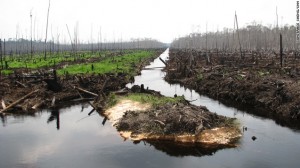
For those following the recent developments of palm oil in the news, you know that this hot commodity is becoming increasingly controversial and companies are starting to either push to get the tropical oil out of their supply chain altogether or to adopt a strong palm policy to ensure they are not contributing to rainforest destruction.
Either way, if you’re a U.S. company with palm oil in your supply chain it’s now quite clear that action is becoming inevitable. As Kyra Choucroun recently wrote in the The Guardian:
The commitment of companies like Unilever and Nestlé to sourcing greener supplies can serve as a lesson beyond the palm oil industry, by promoting the importance of ensuring an ethical supply chain. Whilst blacklisting unethical suppliers can have a positive impact on corporate image, failing to adopt a policy of in depth supply chain analysis can render companies vulnerable to attack from all angles, risking customer loyalty and ultimately business development.
And she’s right about that. The importance of ensuring an ethical supply chain is growing by the day as companies are becoming increasingly vulnerable to internal and external scrutiny from customers, NGOs, and even CEOs risking brand damage and profits.

The most recent company announcing its commitment to responsible palm oil is Kraft Foods. RAN has been in constructive dialogue with Kraft for almost a year and though the company still has a way to go in order to ensure it’s supply chain is free of rainforest destruction, it is taking small steps in the right direction. For starters, Kraft announced in April of 2010 that it was immediately canceling all direct palm oil contracts with Sinar Mas in an effort to disassociate themselves with the widely known forest destroyer. However, they haven’t cut indirect contracts with Sinar Mas; Kraft still sources palm oil from Cargill even though it’s widely known that Cargill still sources from Sinar Mas.
Kraft, among other customers of Cargill, is strongly urging Cargill to sever ties with Sinar Mas – another indicator that Kraft is taking a leadership role in engaging problematic suppliers to transform the industry. Additionally, Kraft is standing firm with Unilever and others in not falling for the recent Sinar Mas greenwash “audit” which tried to wipe the company clean of rainforest destruction and social controversy to convince companies who cut contracts earlier in the year that their business was now responsible.

In recent weeks Kraft sent a “Palm Oil Statement” to RAN, summarizing the food giant’s position on palm oil and highlighting what they’re doing to be a part of the solution short of adopting a palm oil policy. Here are some excerpts from their letter:
We decided to suspend our direct purchases from the Sinar Mas affiliate, Sinar Meadows effective April 1, 2010. The decision to suspend business with Sinar Mas and its affiliates will stay in effect until they clearly demonstrate they comply with local laws and are able to source palm oil sustainably.
In addition to the action described above, we continue to ask our suppliers, including Cargill, to address any indirect supply related to Sinar Mas or its affiliates. We are aware of the recent independent audit of some of Sinar Mas’ palm oil plantations. We are not changing our sourcing decisions in the light of this.
Our suppliers primarily source from Indonesia and Malaysia, with smaller quantities coming from Brazil, Colombia, Mexico and West Africa. We are asking our suppliers to provide solutions and create consensus among stakeholders in addressing the deforestation issue in Indonesia, in particular with regard to strengthening RSPO standards.
When the issue was brought to our attention more than two years ago, we expressed our concern and support for the principle of a moratorium on further deforestation. This requires cooperation from producers (including farmers, cooperatives and post-harvest processors), the food industry, governments and civil society. We are planning to do our part to promote better production standards by purchasing palm oil certificates based on palm oil plantations certified under the RSPO.
Kraft foods supports the goals and efforts of RSPO. However, we believe more needs to be done to enforce guidelines and address deforestation. RSPO needs to reach broad consensus on its certification standards, in particular with regard to climate change impacts of palm oil production.
The tide is turning. As a senior Unilever executive put it in a recent speech to the Consumer Goods Forum in London, to persuade the 300 or so members of the Forum to work together to end deforestation, “Whether we like it or not it is very largely our industry which is providing the economic incentives for individuals and companies to chop down trees….Between us, we spend billions of dollars buying these commodities. We can make a difference if we buy them differently and better.”